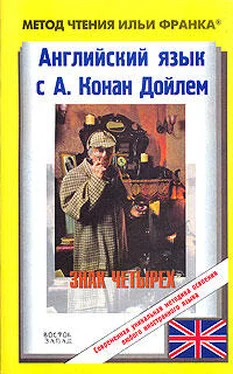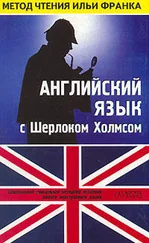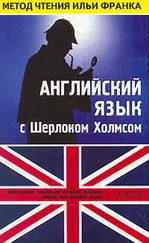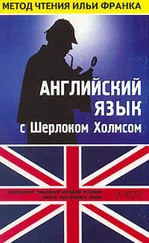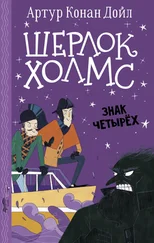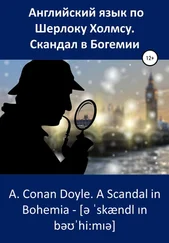impatience [Im'peIS(@)ns], conceive [k@n'si:v], measure ['meZ@]
"My dear Watson, try a little analysis yourself," said he, with a touch of impatience. "You know my methods. Apply them, and it will be instructive to compare results."
"I cannot conceive anything which will cover the facts," I answered.
"It will be clear enough to you soon," he said, in an off-hand way. "I think that there is nothing else of importance here, but I will look." He whipped out his lens and a tape measure, and hurried about the room on his knees, measuring, comparing, examining, with his long thin nose only a few inches from the planks, and his beady eyes gleaming and deep-set like those of a bird. So swift, silent, and furtive were his movements, like those of a trained blood-hound picking out a scent, that I could not but think what a terrible criminal he would have made had he turned his energy and sagacity against the law, instead of exerting them in its defence. As he hunted about, he kept muttering to himself, and finally he broke out into a loud crow of delight.
"We are certainly in luck," said he (нам определенно везет, — сказал он; luck — удача) . "We ought to have very little trouble now (теперь все будет еще легче: «мы должны иметь очень мало беспокойства теперь»; trouble — беспокойство; неприятность) . Number One has had the misfortune to tread in the creosote (Номеру первому не повезло — он наступил на пятно креозота; misfortune — беда, неудача; to tread — идти; наступать; creosote — креозот — жидкость для пропитки деревянных изделий с целью предохранения их от гниения) . You can see the outline of the edge of his small foot here at the side of this evil-smelling mess (здесь, возле этой неприятно пахнущей свалки, можно разглядеть очертания его маленькой ноги: «очертания края его маленькой ноги»; evil — злой; неприятный, противный; to smell — чувствовать запах; обонять; иметь запах; пахнуть; mess — беспорядок; грязь) . The carboy has been cracked, you see, and the stuff has leaked out (видите, бутыль треснула, и содержимое протекло; to crack — трещать; давать трещину; stuff — материал, состав, вещество; to leak — давать течь) ."
"What then?" I asked (и что? — спросил я) .
"Why, we have got him, that's all," said he (ну, он у нас в руках, только и всего, — сказал он; to get — получить; схватить) . "I know a dog that would follow that scent to the world's end (я знаю собаку, которая охотно последует по этому запаху на край света) . If a pack can track a trailed herring across a shire (если любая ищейка: «свора» может по запаху разыскать селедку: «протащенную селедку» /метод тренировки охотничьих собак — по земле протаскивают мешок с копчеными селедками, собака должна найти его по этому следу/ на другом краю графства; pack — пачка; свора; стая; to track — следить; выслеживать; to trail — протаптывать, прокладывать путь; тянуться сзади) , how far can a specially-trained hound follow so pungent a smell as this (как далеко может специально обученная собака проследовать по такому острому запаху; pungent — колющий, острый; резкий, сильный) ? It sounds like a sum in the rule of three (школьное правило нахождения неизвестного члена пропорции: «это напоминает арифметическую задачу на тройное правило»; to sound — звучать; казаться; напоминать; sum — сумма; итог; арифметическая задача; rule of three — тройное правило, правило нахождения неизвестного члена пропорции) . The answer should give us the (и ответ даст нам) —— But hallo! here are the accredited representatives of the law (но что это? вот и полномочные представители закона; accredited — аккредитованный, облеченный полномочиями) ."
ought [O:t], tread [tred]
"We are certainly in luck," said he. "We ought to have very little trouble now. Number One has had the misfortune to tread in the creosote. You can see the outline of the edge of his small foot here at the side of this evil-smelling mess. The carboy has been cracked, you see, and the stuff has leaked out."
"What then?" I asked.
"Why, we have got him, that's all," said he. "I know a dog that would follow that scent to the world's end. If a pack can track a trailed herring across a shire, how far can a specially-trained hound follow so pungent a smell as this? It sounds like a sum in the rule of three. The answer should give us the —— But hallo! here are the accredited representatives of the law."
Heavy steps and the clamour of loud voices were audible from below (тяжелые шаги и звук громких голосов донеслись: «были слышны» снизу; clamour — шум) , and the hall door shut with a loud crash (и дверь холла громко хлопнула: «закрылась с громким грохотом»; crash — грохот, треск) .
"Before they come," said Holmes, "just put your hand here on this poor fellow's arm, and here on his leg (пока они не пришли, — сказал Холмс, — потрогайте руку бедолаги вот здесь, и ногу тут: «просто положите свою руку здесь на руку этого бедного парня и здесь на его ногу») . What do you feel (что вы чувствуете) ?"
"The muscles are as hard as a board," I answered (мускулы тверды как дерево: «доска», — ответил я) .
"Quite so (совершенно верно) . They are in a state of extreme contraction (они сведены сильнейшей судорогой: «они в состоянии крайнего сокращения»; extreme — самый отдаленный; чрезвычайный; исключительный; contraction — сжатие, сокращение) , far exceeding the usual rigor mortis (далеко превосходящей обычное трупное окоченение /лат./) . Coupled with this distortion of the face (если присовокупить эту гримасу на лице; to couple — соединять; связывать; distortion — искажение; искривление; перекашивание; to distort — искривлять, перекашивать) , this Hippocratic smile (эту гиппократовскую улыбку [1] Видимо, имеется в виду «маска Гиппократа» — Hippocratic face — описана Гиппократом как признак тяжелых заболеваний органов брюшной полости: запавшие глаза, заостренный нос, синевато-бледная кожа, покрытая каплями холодного пота.
) , or 'risus sardonicus' (или «risus sardonicus»; risus sardonicus — /лат./ сардонический смех [2] По объяснению древних — смех, напоминающий судорожную гримасу, вызываемую отравлением произраставшей на острове Сардиния /Сардония/ ядовитой травой.
) , as the old writers called it (как называли это классические авторы; old — старый; давнишний, старинный) , what conclusion would it suggest to your mind (какой вывод вам бы все это подсказало: «это предложило бы вашему уму») ?"
Читать дальше
